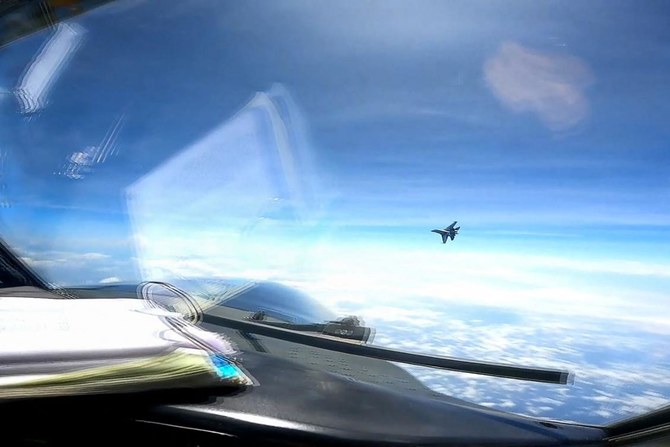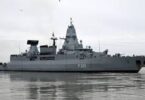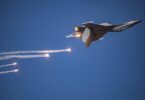WASHINGTON/BEIJING (AFP) : Beijing blamed US “provocation” Wednesday for an incident last week when a Chinese plane crossed in front of an American surveillance aircraft over the South China Sea.
“The United States’ long-term and frequent sending of ships and planes to conduct close surveillance on China seriously harms China’s national sovereignty and security,” foreign ministry spokeswoman Mao Ning said when asked about the incident, demanding Washington “immediately stop this form of dangerous provocation.”
The US military said Tuesday that a Chinese fighter jet flew aggressively close to a US reconnaissance aircraft over the South China Sea, forcing the American pilot to fly through the turbulent wake.
The Chinese J-16 fighter pilot “flew directly in front of the nose of the RC-135,” which was conducting routine operations in international airspace last Friday, US Indo-Pacific Command said in a statement. It called the Chinese move an “unnecessarily aggressive maneuver.”
US defense leaders have complained that China’s military has become significantly more aggressive over the past five years, intercepting US aircraft and ships in the region. And tensions with China have only grown in recent months over Washington’s military support and sales of defensive weapons to self-governing Taiwan, China’s assertions of sovereignty to the contested South China Sea and its flying of a suspected spy balloon over the US
In a further sign of the tensions, China said its defense chief will not meet with US Defense Secretary Lloyd Austin when the two men attend a security conference in Singapore this coming weekend. Austin is scheduled to address the Shangri-La Dialogue on Saturday, while Chinese Defense Minister Gen. Li Shangfu will speak at the gathering on Sunday.
Brig. Gen. Pat Ryder, the Pentagon press secretary, said China informed the US that it was declining Austin’s invitation to meet while they were at the conference. He said Beijing’s “concerning unwillingness to engage in meaningful military-to-military discussions” will not diminish the Defense Department’s commitment to seeking open lines of communication with the Chinese army.
Foreign Ministry spokesperson Mao Ning on Tuesday blamed the US, saying Washington should “earnestly respect China’s sovereignty and security interests and concerns, immediately correct the wrongdoing, show sincerity, and create the necessary atmosphere and conditions for dialogue and communication between the two militaries.”
In a visit to the Indo-Pacific last summer, US Gen. Mark Milley, chairman of the Joint Chiefs of Staff, said the number of intercepts by Chinese aircraft and ships in the Pacific region with US and other partner forces has increased significantly over that time, and the number of unsafe interactions has risen by similar proportions.
China frequently challenges military aircraft from the US and its allies, especially over the strategically vital South China Sea, which China claims in its entirety. Such behavior led to a 2001 in-air collision in which a Chinese plane was lost and pilot killed. Beijing deeply resents the presence of US military assets in that region, and regularly demands that American ships and planes leave the area.
In the statement Tuesday, the US Indo-Pacific Command said America will continue to “fly, sail, and operate — safely and responsibly — wherever international law allows,” and expects all other countries to do the same.







